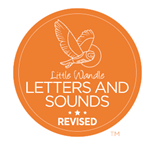Early Reading and Phonics
|
|
Little Wandle Early Reading and Phonics Programme
At Buntingford First School, we are committed to providing the best start in reading for all our children. That’s why we have adopted the Little Wandle Early Reading and Phonics Programme, a highly effective, evidence-based phonics approach that ensures every child can become a confident reader from the very beginning.
What is the Little Wandle Phonics Programme?
The Little Wandle Early Reading and Phonics Programme is a structured and systematic approach designed to teach children how to read and spell. It starts in the reception and year 1, and helps children build a strong foundation in phonics, fluency, and reading comprehension. The programme focusses on helping children recognise the relationship between sounds (phonemes) and letters (graphemes), equipping them with the skills needed to decode words accurately.
Key Features:
1. Clear Structure and Progression: The programme is carefully designed with a step-by-step structure that supports children at every stage of their reading journey. It begins with simple sounds and letters and gradually introduces more complex combinations, ensuring children feel confident as they progress.
2. Consistent Practice: Children are given regular opportunities to apply what they’ve learned through engaging, carefully selected books that match their phonics knowledge. This helps to build their reading fluency and comprehension.
3. Staff Support: Staff at Buntingford First School are trained to deliver the programme with a high level of expertise. Regular assessments ensure that no child is left behind, and individual support is provided when needed.
Why is the Little Wandle Programme Successful?
The success of the Little Wandle programme lies in its research-based design. Numerous studies have shown that systematic phonics instruction is the most effective way to teach early reading. By breaking down the reading process into manageable steps, children can build their reading skills with confidence, leading to a stronger foundation for their future learning.
Impact and Success:
· Improved Reading Outcomes: The Little Wandle programme has been shown to significantly improve children's ability to decode and understand text. Children who follow the programme tend to become more confident, fluent readers who are well-prepared for their later school years.
· Increased Confidence and Motivation: Because children see their progress in small, achievable steps, they develop a positive attitude toward reading and feel motivated to continue learning.
· Inclusive and Accessible: Little Wandle caters to all learners, providing the support needed for children who may struggle with reading, while also challenging those who need to be stretched.
At Buntingford First School, we are proud of the success our children experience with the Little Wandle Early Reading and Phonics Programme, and we are excited to continue nurturing a love of reading for all our students.




